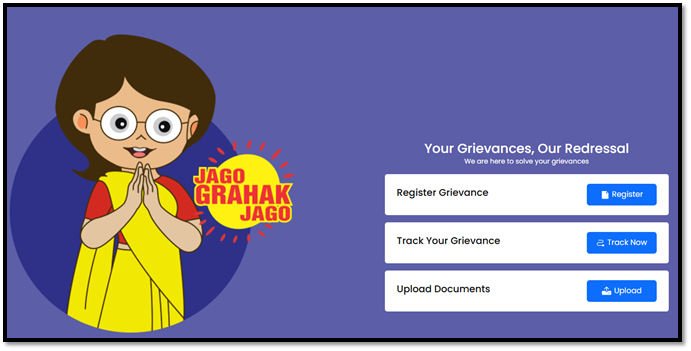Ministry of Consumer Affairs, Food & Public Distribution
Advancing Consumer Rights in India
From Legislation to Digital Solutions
Posted On:
26 NOV 2024 7:15PM by PIB Delhi
Imagine a young couple in India, excited to purchase their first home appliance—a washing machine. After much research, they find what seems to be the perfect model at a great price. However, once they bring it home, the machine fails to work as expected, and the retailer is unresponsive to their concerns. This scenario highlights the importance of consumer protection, ensuring that every individual, regardless of their background, is treated fairly and their rights are upheld. In India, where millions of consumers face similar challenges in a complex marketplace, consumer protection has become more crucial than ever.
To address this, the Indian government has implemented various measures to safeguard consumer interests. The Department of Consumer Affairs plays a pivotal role in addressing grievances and offering effective solutions. Additionally, advancements in technology, such as the evolution of the National Consumer Helpline (NCH), have significantly improved the speed and efficiency of consumer support. Through these initiatives, India continues to strengthen its commitment to consumer protection, ensuring a safer and more transparent marketplace for all.
Consumer Protection Laws and Regulations
The Department of Consumer Affairs (DoCA), under the Ministry of Consumer Affairs, Food & Public Distribution, is at the forefront of consumer protection efforts in India. Constituted as a separate department in June 1997, DoCA was established with the vision of giving a dedicated push to the emerging consumer movement in the country. Since its formation, the department has been entrusted with the responsibility of implementing various consumer protection laws and regulations, as well as facilitating the overall welfare of consumers.
Some of the key responsibilities of the Department of Consumer Affairs include[1]:
- Implementation of the Consumer Protection Act, 2019:
To strengthen consumer protection in the era of globalization, e-commerce, and online platforms, the Consumer Protection Act, 2019 was enacted to replace the Consumer Protection Act, 1986[2]. The 2019 Act enhances consumer protection, particularly for online transactions. It expands the definition of "consumer" to include individuals engaging in online purchases or services, a provision absent in the 1986 Act. Additionally, the Act defines advertisements to encompass all forms of publicity, including those on electronic media, the internet, and websites. The Act also established the Central Consumer Protection Authority (CCPA), effective from July 24, 2020, to regulate matters like false or misleading advertisements that harm consumers.
- Implementation of the Bureau of Indian Standards Act, 2016:

The Bureau of Indian Standards (BIS), India’s national standards body, is responsible for the development of standards, quality certification, and marking of goods, ensuring the safety, reliability, and quality of products. BIS’s work benefits the economy by minimizing health hazards, protecting the environment, promoting exports, and addressing public policies like Swachh Bharat Abhiyan, Digital India, Make in India, and Ease of Doing Business. The BIS Act, 2016, positions BIS as the National Standards Body, allows multiple conformity assessment schemes, and mandates certification for products linked to health, safety, and national security. The Act also introduces consumer protection measures, including product recalls and penalties.[3]
- Implementation of Standards of Weights and Measures - The Legal Metrology Act, 2009:
Legal Metrology (Weights and Measures) Laws form the basis of commercial transaction in any civilized society. To ensure accuracy of measurement in such transaction, the Government has enacted legislation namely, the Legal Metrology Act, 2009 (1 to 2010). The said Act is unified act of two repealed acts namely the Standards of Weights & Measures Act, 1976 & the Standards of Weights & Measures (Enforcement) Act, 1985. The Legal Metrology Act, 2009 has come into force with effect from 1st April, 2011. Rules have been formulated for better implementation of the Act.
Other Steps
- Guidelines for Regulation of Dark Patterns (2023): Dark patterns refer to design strategies that manipulate consumers into making decisions that are not in their best interest. The CCPA has taken a strong stance against such practices by issuing guidelines for their regulation, focusing on protecting consumers from deceptive online practices such as drip pricing, disguised advertisements, and false urgency.
- The Department of Consumer Affairs (DoCA) has been conducting nationwide multimedia awareness campaigns under the title “Jago Grahak Jago” to promote consumer awareness. These campaigns deliver simple messages to educate consumers about fraudulent practices, common issues, and the available mechanisms for seeking redress. The strategy behind the Information, Education, and Communication (IEC) activities under this initiative is designed to conduct an effective and comprehensive consumer awareness campaign that reaches urban, semi-urban, rural, and remote areas.
- Additionally, DoCA has introduced “Jagriti,” a mascot aimed at empowering consumers and raising awareness of their rights.
Technological Advancements in Consumer Grievance Redressal
In recent years, significant strides have been made in improving the efficiency and accessibility of consumer grievance redressal mechanisms, particularly through the National Consumer Helpline (NCH). The NCH, which is a crucial component of India's consumer protection framework, has undergone a technological transformation aimed at improving its call-handling capacity and making the grievance redressal process more seamless.
- National Consumer Helpline (NCH)
The National Consumer Helpline (NCH) has emerged as a central point of access for consumers seeking to address their grievances. It has played an essential role in enabling consumers to register complaints and seek resolutions in an efficient and effective manner. In a notable development, the number of calls received by NCH has grown nearly tenfold, from 14,795 calls in January 2015 to 1,41,817 calls in January 2024. This surge indicates the growing trust and confidence consumers place in the helpline as a reliable resource for resolving issues. The Department has revamped the National Consumer Helpline (NCH), making it a central platform for grievance redressal at the pre-litigation stage. Available in 17 languages, including Hindi, English, and regional languages, the helpline allows consumers to register complaints via the toll-free number 1915. Complaints can also be filed through the Integrated Grievance Redressal Mechanism (INGRAM) portal, which provides multiple channels such as WhatsApp, SMS, email, the NCH app, web portal, and the Umang app for ease of access.

Additionally, the NCH has partnered with over 1000 companies under its Convergence Programme. These companies span various sectors, including e-commerce, banking, telecommunications, and retail. By collaborating with these organizations, the NCH ensures that complaints related to these companies are directly transferred to them for resolution. The number of convergence partners has steadily increased, from 263 companies in 2017 to 1009 companies in 2024, highlighting the success of this initiative in improving grievance redressal efficiency.
To further enhance the consumer grievance redressal process, the NCH is rolling out the NCH 2.0 initiative, which incorporates advanced technologies to streamline complaint handling. This includes the introduction of AI-powered Speech Recognition, a Translation System, and a Multilingual Chatbot. These innovations aim to make the grievance filing process more inclusive, enabling consumers from diverse linguistic backgrounds to file complaints in their local languages through voice input. The AI-powered Speech Recognition and Translation System enables consumers to file complaints using voice input in their local languages, reducing manual intervention. The Multilingual Chatbot streamlines the process by offering real-time assistance and minimizing data entry, improving the overall user experience.
National Consumer Day
In India, National Consumer Day is celebrated annually on December 24th to commemorate the enactment of the Consumer Protection Act, 1986, (replaced by Consumer Protection Act 2019) which received the assent of the President on this date.
The Consumer Protection Act, 1986 was a pioneering piece of legislation that aimed to protect consumers from exploitation in various sectors, such as goods and services. It introduced the concept of consumer courts, which empowered consumers to seek justice and redress in cases of defective products, deficient services, and unfair trade practices. The Consumer Protection Act establishes a three-tier system for resolving consumer disputes, comprising three levels of consumer courts:
- District Consumer Disputes Redressal Forum (District Forum) – the first level, located at the district court.
- State Consumer Disputes Redressal Commission (State Commission) – the second level, at the state level.
- National Consumer Disputes Redressal Commission (National Commission) – the highest level, operating at the national level.
The District Forum and State Commission are created by individual states with approval from the Central Government, while the National Commission is established by the Central Government. These forums do not replace the jurisdiction of civil courts but offer an alternative remedy for consumer grievances. The Consumer Protection Act, 1986, empowers both the Central and State Governments to create rules governing various aspects of the consumer protection system. The basic consumer rights that have formed the foundation of modern consumer protection in India are:
- The Right to Safety
- The Right to Be Informed
- The Right to Choose
- The Right to Be Heard
- Right to Seek Redressal
- Right to Consumer Education
Conclusion
The protection of consumer rights is a global priority that requires continuous effort from governments, businesses, and consumer organizations. Through initiatives like World Consumer Rights Day, National Consumer Day, and various reforms in consumer protection laws and mechanisms, significant progress has been made in safeguarding the interests of consumers worldwide. The Department of Consumer Affairs in India, in particular, has been a driving force in enhancing consumer protection, with initiatives like the National Consumer Helpline and the NCH 2.0 upgrades further strengthening grievance redressal systems.
Reference:
Advancing Consumer Rights in India
*******
Santosh Kumar/Sarla Meena/ Ishita Biswas
(Release ID: 2077618)
Visitor Counter : 748